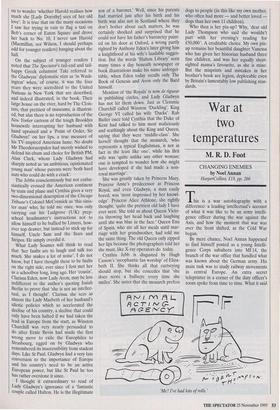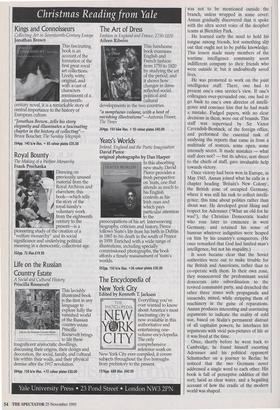War at two temperatures
M. R. D. Foot
CHANGING ENEMIES by Noel Annan HarperCollins, f18, pp. 266 This is a war autobiography with a difference: a leading intellectual's account of what it was like to be an army intelli- gence officer during the war against the Axis, and how the moment that war was over the front shifted, as the Cold War began.
By mere chance, Noel Annan happened to find himself posted as a young Intelli- gence Corps subaltern into MI 14, the branch of the war office that handled what was known about the German army. His main task was to study railway movements in central Europe. An extra secret teleprinter in a corner of the duty officer's room spoke from time to time. What it said `Me? I've had lots of rolls.' was not to be mentioned outside the branch, unless wrapped in some cover; Annan gradually discovered that it spoke with the ultra secret voice of the decipher teams at Bletchley Park.
He learned early the need to hold his tongue among friends, lest something slip out that ought not to be public knowledge. This lesson made many members of the wartime intelligence community seem indifferent company to their friends who were outside it; but it undoubtedly saved lives.
He was promoted to work on the joint intelligence staff. There, one had to present one's own service's view. If one's colleagues over-persuaded one, one had to go back to one's own director of intelli- gence and convince him that he had made a mistake. Fudged papers, with no clear decisions in them, were out of bounds. This staff was supervised by Sir Victor Cavendish-Bentinck, of the foreign office, and performed the essential task of analysing the reports that came in from a multitude of sources, some open, some intensely secret. It made mistakes — what staff does not? — but its advice, sent direct to the chiefs of staff, gave invaluable help towards victory.
Once victory had been won in Europe, in May 1945, Annan joined what he calls in a chapter heading 'Britain's New Colony', the British zone of occupied Germany, where it was still his task to collect intelli- gence; this time about politics rather than about war. He developed great liking and respect for Adenauer ('What an old fox he was!'), the Christian Democratic leader who rose later to eminence in west Germany, and retained his sense of humour whatever indignities were heaped on him by his country's conquerors. (He once remarked that God had limited man's intelligence, but not his stupidity.) It soon became clear that the Soviet authorities were out to make trouble for the British and Americans, rather than to co-operate with them. In their own zone, they manoeuvred the predominant social democrats into subordination to the revived communist party, and drenched the other three zones with propaganda and innuendo, mixed, while stripping them of machinery in the guise of reparations. Annan produces interesting and convincing arguments to indicate the reality of cold war, based on Stalin's permanent distrust of all capitalist powers; he interlaces his arguments with vivid pen-pictures of life as it was lived at the time.
Once, shortly before he went back to Cambridge, he found himself escorting Adenauer and his political opponent Schumacher on a journey to Berlin; he noticed that the two Germans never addressed a single word to each other. His book is full of perceptive oddities of this sort; lucid as clear water, and a beguiling account of how the cradle of the modern world was shaped.



















































































 Previous page
Previous page